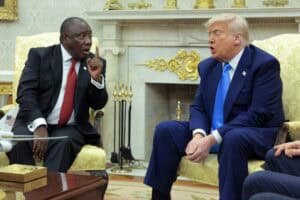The president cannot control the price of electricity and has no input in terms of cost.

Although President Cyril Ramaphosa has pledged an improved energy system and ‘more affordable” power when South Africa emerges from its electricity crisis, the reality is that electricity will not get any cheaper, say experts.
In his address at a Freedom Day rally in North West, Ramaphosa recognised that celebrations were hollow without electricity, but promised to ‘restore Eskom’s power stations” and ‘build new generating capacity as a matter of the greatest urgency”.
The power system, he promised, ‘will be more stable, more reliable, more affordable and more sustainable”.
According to Ramaphosa, freedom could not be meaningful when South African homes and businesses were without electricity for several hours in the day.
ALSO READ: Eskom Debt Relief Bill passed
New energy requires capital
Energy expert Ruse Moleshe said in terms of affordability, to build new or additional infrastructure, or even just to improve it, requires capital.
Moleshe said there was no way electricity could become cheaper, given SA’s large electricity infra-structure requirements, including power, generation, transmission and distribution.
The National Energy Regulator of South Africa (Nersa) approved an application for Eskom to hike its tariffs in January.
The increases were 18.65% for standard Eskom customers and 18.49% for municipalities for the 2023-24 financial year.
ALSO READ: SA’s electricity crisis: ‘Too many fingers in power pie’
Consumer will foot the bill, not government
‘The cost of improving performance of the energy system will be borne by the consumer through electricity tariff increases,” Moleshe said.
‘It will not be cheaper and the trend is likely to continue in an upward trajectory.” Moleshe said tariff determination in terms of the Electricity Regulation Act was the responsibility of the regulator.
The Presidency did not get involved in that process and thus had no input in terms of the costs of electricity generation.
‘Recently, the president indicated he would ask Eskom to reduce the tariffs granted by Nersa that became effective on 1 April, which did not happen and was never feasible in the first place as they are the only entity with the mandate to do so,” she said.
ALSO READ: ANC needs to find common ground on load shedding before 2024 polls
South Africa comparative electricity costs
South Africa’s electricity price in September last year averaged R2.78 per kilowatt hour, which is in line with other parts of the world and half of the most expensive global electricity price.
Neighbouring countries like Namibia charge R1.93, Botswana R1.592 and Zimbabwe about R0.53.
Countries which charge over R4 per kWh include the Bahamas, Cyprus and Ireland. And the countries where electricity costs about double what it does in South Africa are mostly European countries, such as the UK at R4.303, Belgium R4.598, Denmark R5.076 and Germany at about R5.497.
Chief economist at Efficient Group Dawie Roodt said Ramaphosa’s speech was another ex-ample of living in the past and not planning for the future.
‘The thing that really bothers me is that it is a little bit like an alcoholic. ‘The first step for an alcohol-ic to be rehabilitated is to admit they are an alcoholic.
ALSO READ: Ramaphosa’s Freedom Day speech: ‘No electricity, no freedom’
This ANC government and the president do not want to admit that the problem is the ANC,” he said.
Roodt said if SA wanted to in-vest in more generation capacity and infrastructure in the country, it would not come cheap ‘for a number of reasons, but the very important reason is that it is much better to maintain some-thing than to rebuild something – but we have destroyed a lot of things in SA.
‘To rebuild those things will be very costly and someone needs to pay for that. ‘I am afraid the real cost to SA and the damage to the economy is not the lack of electricity or infrastructure but the damage is a government that is mostly incompetent and quite often simply corrupt and the president is just not prepared to admit that,” Roodt said.
Support Local Journalism
Add The Citizen as a Preferred Source on Google and follow us on Google News to see more of our trusted reporting in Google News and Top Stories.






